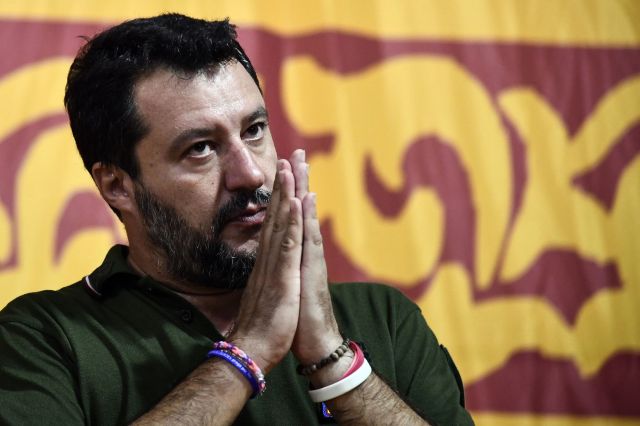Credit: MARCO BERTORELLO/AFP/Getty Images

Italy tends to rattle through a government a year – or at least that’s what it’s been doing since the Second World War. So you’d forgiven for dismissing the latest debacle as business as usual. But you’d be wrong. This time, an alliance of two populist parties, the first to govern a Western European democracy, has been replaced by a coalition joining one of them with a mainstream party, another first.
The country is in trouble. It rests on an unfair and inefficient politico-economic equilibrium, which hinders innovation, competition and creative destruction to protect vested interests. Average incomes have barely grown for a quarter of a century. And distrust for the political system is deep and widespread. Hence the success of demagogic politics, on both sides of the political spectrum.
The main beneficiaries were the Five Star Movement and the far-right League. At the March 2018 election they won 33% and 17% of the vote, respectively, and formed a government together, which challenged and momentarily rattled the EU.
Although the two parties might seem similar, however, their coalition was always an ill-starred one. As I explained here before, while Five Star rose to challenge Italy’s political establishment, the League is a party of the status quo. Its rhetoric, which acts as a cover for that strategic priority, is directed against immigrants and Europe; Five Star’s is couched in the language of transparency, accountability, public integrity and the rule of law – all urgent priorities, but ones that challenge the vested interests that the League represents.
Indeed, before starting serious negotiations with the League, Five Star explored a possible alliance with the Democratic Party (PD) – the mainstream centre-Left party that dominated the 2013–18 cabinets, which did very little to change that equilibrium, and suffered a stiff electoral defeat in 2018. Although they were political adversaries, policy compatibility seemed greater between them than between Five Star and the League. Five Star and PD could have found common ground in vital areas – on social insurance reform, for example, on the fight against corruption and tax evasion, on public administration reform, and on a pro-growth public-expenditure review. I argued at the time that I saw a Five Star-PD coalition as the preferable solution in a hung parliament.
But the talks were called off when the PD’s former leader – Matteo Renzi, who had resigned but still controlled the parliamentary party – vetoed them, mandating the party to go into opposition. Five Star and the League had won the elections, he said, and should govern together (“we’ll sit back, watch the show, and eat popcorn”, he added). So the second largest party effectively withdrew from the game of coalition making, and Five Star and the League began their negotiations in earnest. What followed was quite a show.
Mutual suspicion led Five Star and the League to write down a detailed coalition contract and choose a non-partisan PM (an unknown academic, Giuseppe Conte, without any political or executive experience). Lacking either a clear policy vision or a plausible diagnosis of the country’s problems, Five Star was thoroughly outmanoeuvred by the League. Under Matteo Salvini’s leadership, the party was skilful in directing discontent against scapegoats such as migrants, Brussels, and even burglars, and then used its rising popularity to open political battles with Five Star, one after the other, corner it, and pass the legislation it wanted – often cruel, in the field of migration and law and order, and sometimes absurd. Having stimulated the demand for such policies with his divisive, hate-filled rhetoric, Salvini could satisfy the interests of his core electorate – with targeted tax cuts, an amnesty for tax evasion and spending policies that favour vested interests – while paying no political costs.
On the contrary, over 12 months the balance of power within the coalition was reversed. In the latest opinion polls before the government fell the League stood at 36-39%; Five Star, which appeared to have renounced its foundational public-integrity message, stood at 16-17%.
It was to cash in this surge that Salvini abruptly denounced the alliance with Five Star, on 8 August, claiming that his coalition partner was blocking the League’s policies. He was aiming for a snap election, to win enough support to govern alone (or together with a small grouping of neo-fascists and the far-right Fratelli d’Italia, Brothers of Italy). In a tour of the country’s beaches, wearing swimming trunks, neck chain and sunglasses he demanded full powers to make Italy great again.

The League seemed unstoppable, and disquiet swept the country. Not just in the op-ed pages but also in the streets, and the beaches: after Salvini’s ‘full-powers’ speech, loud and imaginative crowds of protesters began to disturb his seaside pronouncements.
But the dissolution of parliament is a prerogative of the head of state, and during the summer recess it took a while for the League to have parliament table its motion of no confidence. So the tempo of the crisis was slowed down, and the League’s opponents could reorganise.
On 13 August Renzi surprised everyone by proposing a Five Star-PD government, to avert the risk of the far right winning an outright majority.And when parliament was finally convened, on 20 August, Salvini suffered a rare public-relations defeat. When in the Senate Conte reproached the League’s leader for some of his more shameful measures – each of which Conte had formally endorsed, naturally, voicing hardly any reservation – Salvini stumbled. He seemed as effective in delivering slogans on a beach, mojito in hand, as he was ill-at-ease facing reasoned criticism in parliament, lacking even the wit to call out its hypocrisy.
Conte had been ridiculed for his embellished CV, and then disparaged for meekly bowing to Salvini’s ever growing demands, but that day became a statesman in the eyes of some observers.
Thus the dynamic of the crisis changed. The League appeared to be losing support, talks on a Five Star-PD cabinet commenced, and Salvini began to backtrack, eventually inviting Five Star to form another government together. Five Star refused; its talks with the PD proceeded.
Despite commanding twice as many parliamentary seats as the PD, Five Star had little bargaining power. It was the party that feared snap elections the most, for it could lose more than half its votes, and it had just demonstrated remarkable executive incompetence and tactical ineptitude.
The PD, however, was and remains split between Renzi’s faction, more centrist and liberal, and a loose alliance of other factions, both centrist and left wing. These divisions strengthened Five Star’s hand, to the point that when it demanded the reappointment of Conte as PM – which Donald Trump unsurprisingly supported – the PD obliged, at Renzi’s insistence.
The deal was struck on 28 August. The following morning the head of state reappointed Conte as PM. Five Star and the PD then drew up a programme. On 3 September the deal was overwhelmingly approved by Five Star’s registered members (fewer than 60,000 voted). And by 9 September Conte and his cabinet are expected to receive parliament’s vote of confidence. Things have come full circle, after 14 months of mostly damaging or pointless executive action.
The markets reacted positively: after a significant spike in the wake of Salvini’s no-confidence motion, the interest-rate spread between Italian and German treasury bonds fell consistently, and now stand at the lowest level since May 2018 (when the League and Five Star agreed their coalition).
Yet it is hard to be optimistic. Past performance suggests that Five Star lacks the ideas and the PD lacks the will to change Italy’s social order, which lies at the roots of the country’s malaise. All that can be said in favour of this cabinet is that it is likely to be better – less ill-intentioned, frankly, and possibly more competent – than its predecessor, and that it may gain useful time for opponents of the far right, and perhaps also for fresh, better political options to emerge.
Having frightened much of Italy and Europe, Salvini ultimately appeared weaker and less skilful than it was assumed. His past successes stemmed from the weakness of his competitors. But if this coalition disappoints, Salvini will rise again.










Join the discussion
Join like minded readers that support our journalism by becoming a paid subscriber
To join the discussion in the comments, become a paid subscriber.
Join like minded readers that support our journalism, read unlimited articles and enjoy other subscriber-only benefits.
Subscribe